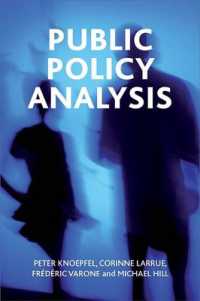- ホーム
- > 洋書
- > ドイツ書
- > Humanities, Arts & Music
- > Philosophy
- > general surveys & lexicons
Description
(Text)
In 1946 John von Neumann stated that science is stagnant along the entire front of complex problems, proposing the use of largescale computing machines to overcome this stagnation. In other words, Neumann advocated replacing analytical methods with numerical ones. The invention of the computer in the 1940s allowed scientists to realise numerical simulations of increasingly complex problems like weather forecasting, and climate and molecular modelling. Today, computers are widely used as computational laboratories, shifting science toward the computational sciences. By replacing analytical methods with numerical ones, they have expanded theory and experimentation by simulation.
During the last decades hundreds of computational departments have been established all over the world and countless computer-based simulations have been conducted. This volume explores the epoch-making influence of automatic computing machines on science, in particular as simulation tools.
(Table of content)
11 - 18 A Brief Introduction to the Volume (Gabriele Gramelsberger)19 - 44 From Science to Computational Sciences (Gabriele Gramelsberger)48 - 56 Roots and Media of Computational Power (Sybille Krämer)57 - 63 The Early Progress of Scientific Simulation (David Alan Grier)65 - 84 Mimetic Experiments before the Invention of the Computer (Thomas Brandstetter)85 - 95 Computer Simulation in the V-2 Rocket Development (Thomas Lange)97 - 130 Computer Simulations and the Trading Zone (Peter L. Galison)131 - 142 From Computation with Experiments to Experiments with Computation (Gabriele Gramelsberger)145 - 150 Towards A Definition of Simulation (David Alan Grier)151 - 163 Simulation as a New Style of Research (Sergio Sismondo)165 - 176 Artificial, False, and Performing Well (Johannes Lenhard)177 - 193 Explanatory and Predictive Functions of Simulation Modelling Case (Erika Mansnerus)195 - 207 Research Technology, the Computer and Scientific Progress (Renate Mayntz)209 - 217 Shaping Realitywith Algorithms (Johann Feichter)219 - 226 Uncertainty in Grammar / The Grammar of Uncertainty (Peter Bexte)229 - 233 Authors
(Review)
"Wem das zu abgehoben scheint, der möge an die nächste Aschewolke im internationalen Luftraum denken oder an konkurrierende Modelle der Erderwärmung: Die Simulation und ihre Algorithmen bestimmen eben mitunter im Wortsinn, mit welcher Wirklichkeit wir rechnen. Weshalb man sich die Sach schon ein wenig näher ansehen kann." Helmut Mayer, FAZ
(Author portrait)
Gramelsberger, GabrieleGabriele Gramelsberger ist Professorin für Wissenschaftstheorie und Technikphilosophie an der RWTH Aachen. Ihre aktuellen Forschungsschwerpunkte sind die Digitalisierung von Wissenschaft und Forschung und die maschinische Epistemologie künstlicher Intelligenz.








